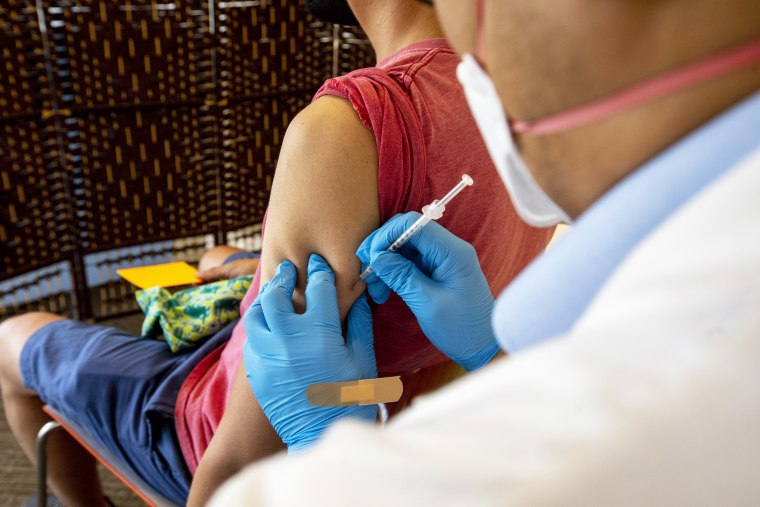San Francisco will not renew its monkeypox public health emergency declaration when it expires at the end of the month.
Daily cases of the virus in the U.S. have declined eightfold in the last two months, from an average of around 400 on Aug. 19 to fewer than 50 on Wednesday, according to data from the Centers for Disease Control and Prevention.
"We don’t want to declare victory prematurely, but it does seem like we are winning," said Stephen Morse, an epidemiology professor at Columbia University.
Other cities and states must also now decide whether to extend or end their own emergency orders.
New York City's is set to expire on Sunday, and New York state's on Thursday; neither have said whether those orders will be renewed. Illinois’ order expires on Nov. 2, and its state health department said it continues to evaluate the order every 30 days. The California Department of Public Health said the state is not planning to lift its order at this time.
"When we lift emergency declarations, it reduces the level of fear, but also reduces the level of awareness and the resources that are available," Morse said, adding, “I wish we had a better way to tell people, 'It’s not over, but it looks like it’s getting better, and we should continue to fund it and continue to be vigilant.'"
But eradicating monkeypox in the U.S. isn’t likely, experts said.
"It would be really foolish to think that we’re going to eliminate this," said Amira Albert Roess, a professor of global health and epidemiology at George Mason University. "We just have to accept that we’re now in a different phase of the history of monkeypox. This is now the phase where we’re going to see outbreaks every now and then."
Many experts are optimistic that, eventually, the U.S. could sometimes see no new monkeypox cases within a limited time frame. But they cautioned that future infections are inevitable, since the virus continues to circulate in other parts of the world. It could also linger in animal populations such as squirrels or prairie dogs, then jump back into people.
"Hopefully it won’t be able to maintain itself in animals here, in which case we can say that essentially it’s gone here and we won’t have to worry about it until the next time," Morse said. "That is the most optimistic scenario."
A handful of new monkeypox deaths
The majority of monkeypox cases are still among men who have sex with men, and the virus is primarily spreading through close contact during sexual activity.
Because the U.S. has ramped up monkeypox vaccinations — as of Tuesday, more than 975,000 doses had been administered — recent cases have tended to be among immunocompromised people, according to Dr. Stuart Isaacs, an associate professor of medicine at the University of Pennsylvania.
Vaccines might not be as effective for this group, so they might remain at risk.
That could explain the six monkeypox deaths reported this week, in Chicago, Maryland, Nevada and New York City.
Maryland's health department said the patient who died there was immunocompromised, and Chicago's department said both deaths there were patients diagnosed more than six weeks ago who had multiple other health conditions, including weakened immune systems. New York City did not offer details about its two deaths, and Nevada said the death there was attributed to other causes.
California, Texas and Ohio have each reported one monkeypox death since the outbreak's beginning as well.
'It could have been a lot worse'
A combination of vaccinations and behavioral changes — such as people reducing their number of sexual partners — likely helped curb the virus' spread, experts said.
"The main populations most at risk are being educated, being tested, being vaccinated," Isaacs said.
But all three experts also pointed to flaws in the U.S. response.
At the start of the outbreak, physicians had to order tests through public health labs, which slowed the process of diagnosing cases. The U.S. stockpile of doses of Jynneos, a preventative two-dose vaccine for monkeypox and smallpox, was also not sufficient to keep pace with transmission.
Unvaccinated people have 14 times the risk of developing the disease compared to people who receive at least one dose, according to the CDC.
The U.S. didn’t order more Jynneos doses until June, even though the virus started spreading in May, and more than 1 million doses were temporarily held up at a manufacturing facility over the summer as they awaited inspection by the Food and Drug Administration.
"It’s always after the outbreak, after the fact, that we get the resources that we need. That’s unfortunately the reality of public health in the U.S., and it needs to change," Roess said.
Racial inequities also persist in vaccine distribution, so Black and Hispanic people consequently make up a disproportionate share of monkeypox cases. More than 30% of doses administered thus far have gone to white people, with less than 14% to Hispanic people and less than 8% to Black people, according to the CDC.
The outbreak has taught health officials, however, about how well monkeypox vaccines and treatments work — information that will be useful the next time the U.S. identifies a new chain of cases.
In August, the FDA began allowing health care providers to administer one-fifth of the original Jynneos dosage in order to make the most of limited vaccine supply. To do that, the shot has to be administered under the top layer of the skin, rather than into a layer of fat between skin and muscle. Morse said early data suggests that the new method might be sufficient.
The U.S. is also collecting some of the first real-world data about the effectiveness of Tpoxx — an antiviral drug authorized for use against smallpox — among monkeypox patients.
Despite the delays and failings in the U.S., Morse said, the monkeypox outbreak "could have been a lot worse."

